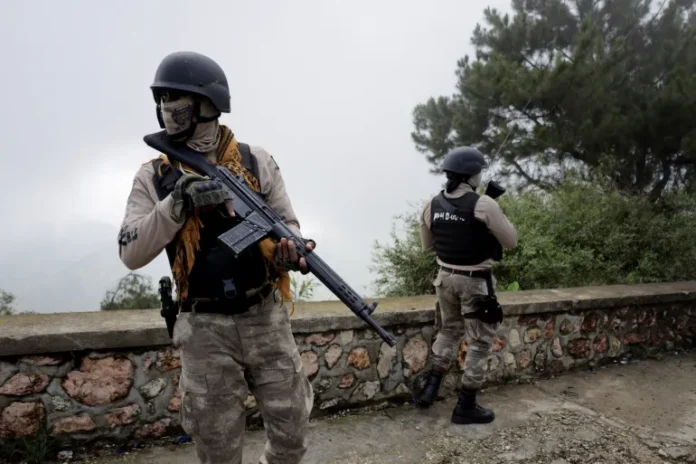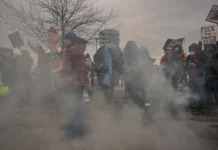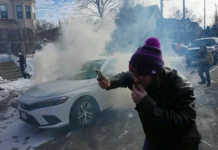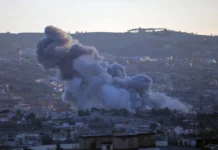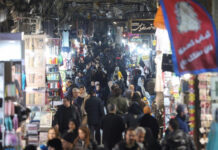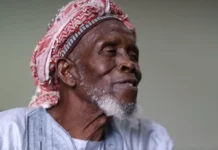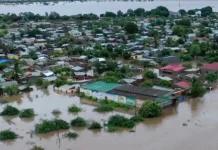(AP) — Explosive drones targeting a suspected gang leader killed at least eight children inside a slum in Haiti’s capital and seriously wounded six others, relatives and activists told The Associated Press on Monday, as they blamed police for the attack.
The explosions happened Saturday night in Cité Soleil, which is controlled by Viv Ansanm, a powerful gang coalition that the U.S. has designated as a foreign terrorist organization.
One of its leaders, Jimmy Chérizier, best known as Barbecue, vowed to avenge the attacks, with a total of at least 13 people killed, according to residents.
“This is my daughter,” said Claudia Bobrun, 30, as she showed the AP a video of her 8-year-old girl lying in a pool of blood.
Tears rolled down her face as she replayed the video.
Michelin Florville, 60, said the explosion killed two of his grandchildren, ages 3 and 7, and his 32-year-old son.
“People were running right and left,” he recalled, noting that he was standing near where one explosion occurred.
Meanwhile, Nanouse Mertelia, 37, said she was inside her house on Saturday night and ran out to see what happened after hearing an explosion. Her son had left their home several minutes earlier to get something to eat.
She found him on the ground, his leg and arm blown off.
“Come get me, come get me, please mama,” she said he told her, but he had lost too much blood. “By the time we got to the hospital, he died.”
A question of accountability
Haiti’s National Human Rights Defense Network accused police of launching two exploding drones in the Simon Pelé community of Cité Soleil as suspected gang leader Albert Steevenson, known as Djouma, prepared to celebrate his birthday.
The group said that Steevenson was distributing gifts to children when the attack occurred.
Romain Le Cour, head of Haiti Observatory at the Global Initiative Against Transnational Organized Crime, said the attack raises “urgent questions of accountability.”
“It has now been 48 hours since the incident, and the authorities have yet to issue any official communication or assume public responsibility. Who, ultimately, will assume responsibility for this attack: The prime minister? The transitional presidential council? Private security companies? The leadership of Haiti National Police?” he asked.
Le Cour said the attacks would only reinforce the gang coalition’s anti-government narrative at a critical juncture.
“They are also likely to deepen public mistrust in state institutions and accelerate the erosion of governmental legitimacy,” he said.
Lionel Lazarre, a spokesman for Haiti’s National Police, did not immediately return a message seeking comment.
Also killed in Saturday’s attack were three civilians and four suspected gang members, with seven other gunmen injured, according to the human rights group.
Among the civilians killed was 33-year-old St-Jean Limonthard, whose mother often worried about him working as a moto taxi driver in a capital that is 90% is controlled by gangs.
“I prayed for him every day that he went out, and now he died in his own neighborhood coming back from work,” said his mother Aglamoïde Saint-Ville, 53, as she held her son’s 6-year-old daughter in her lap.
Saint-Ville said her son was the head of the family.
“The child won’t be able to go to school,” she said. “I don’t know how we’re going to eat since we had no savings.”
Explosive drones under scrutiny
Activists noted that a similar operation involving explosive drones in downtown Port-au-Prince killed at least eleven civilians earlier this month.
The human rights group said several gang members have been killed in drone attacks since March.
“However, the drones have not targeted terrorist leaders. On the contrary, these leaders have grown more at ease and increasingly arrogant, even moving openly in convoys. Drones must not be selective, and they must also ensure the protection of civilians to avoid collateral damage,” it said.
A spokesperson for the office of Prime Minister Alix Didier Fils-Aimé could not be immediately reached for comment.
A new task force created earlier this year has operated outside the oversight of Haiti’s National Police and employed the use of explosive drones. The task force was made up of certain police units and private contractors.
The attack comes as Vectus Global, the security firm of former U.S. Navy Seal Erik Prince, expects to deploy nearly 200 personnel from various countries to Haiti as part of a one-year deal to quell gang violence there.
In June, Fritz Alphonse Jean, then-leader of Haiti’s transitional presidential council, confirmed that the government was using foreign contractors. He declined to identify the firm or say how much the deal was worth.
The private contractors are expected to reinforce an underfunded and understaffed police department working with Kenyan police leading a U.N.-backed mission struggling to fight gangs.
The U.N.-backed mission has 991 personnel, far less than the 2,500 envisioned, and some $112 million in its trust fund — about 14% of the estimated $800 million needed a year, according to a recent U.N. report.
On Sunday, U.N. Secretary-General António Guterres met with Laurent Saint-Cyr, president of Haiti’s transitional presidential council. They agreed that “urgent international action is needed to help restore security,” according to a U.N. statement.
Christopher Landau, deputy secretary of the U.S. Department of State, reiterated the call for a “gang suppression force” at U.N. headquarters on Monday.
“The time for action is now,” he said. “This is not a crisis that can be ignored or deferred.”









